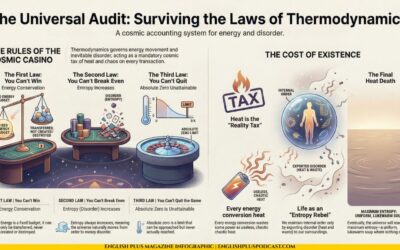Black Holes: Where Space and Time Cease to Exist
Picture this: a star, many times bigger than our sun, reaches the end of its life. In a spectacular cosmic explosion, it collapses under its own immense gravity. What remains isn’t a star anymore, but an unimaginably dense point called a singularity – a black hole.
The Gravity Trap
A black hole’s gravitational pull is so monstrous that not even light, the fastest thing in the universe, can escape it. The border around this zone of no return is called the event horizon. It’s like the ultimate ‘point of no return’ in space.
Think of a waterfall: as you get closer to the edge, the water’s pull gets stronger. If you cross a certain point, there’s no way to paddle back against the current. The event horizon is like that point for a black hole.
Extreme Physics
But what happens after you cross the event horizon? Here’s where things get weird. Inside a black hole, our grasp of physics starts to break down. Gravity is so strong that it warps space itself, and inside the black hole, the very fabric of reality becomes distorted.
Another mind-blowing effect is how time behaves near a black hole. Due to their intense gravity, time slows down. Imagine an astronaut approaching a black hole while her friend is further away. To the distant friend, the astronaut near the black hole will seem to be moving in slow motion!
Not Just Cosmic Vacuum Cleaners
Black holes aren’t just about destruction. They play a crucial role in shaping galaxies, influencing the orbits of stars, and even triggering the birth of new ones. Despite their dark and mysterious nature, they’re also key to understanding the very evolution of our universe.
Exploring the Enigma
How do we even know black holes exist if nothing escapes them? Scientists detect them indirectly by observing their effects on surrounding matter. Like whirlpools swirling water, black holes pull nearby stars and gas into a swirling disk, emitting powerful radiation that helps pinpoint their location.
Sparking Your Imagination
Black holes are a testament to the vast and strange universe we inhabit. They spark questions about the limits of space, time, and the laws of nature. Even though they’re shrouded in mystery, they fuel our curiosity.
Ready to keep exploring? Here’s something to do:
- Search online for simulations and documentaries about black holes. The visual imagery can be mind-bending!
The study of black holes pushes the boundaries of our knowledge, and who knows what fascinating discoveries we’ll make next as we peer into their cosmic depths.
Why Should You Care?
- The Thrill of the Unknown: Black holes represent the limits of our knowledge, a cosmic frontier that challenges our understanding of the universe.
- Fundamental Science: Studying black holes forces us to rethink concepts like gravity, space, and time. Unlocking their secrets has the potential to revolutionize physics.
- Cosmic Perspective: Understanding these strange celestial bodies helps us appreciate the vastness, complexity, and awe-inspiring nature of our universe.
Key Takeaways
- Black holes form from the collapse of massive stars and have immense gravitational pull.
- They have a point of no return called the Event Horizon, beyond which nothing escapes.
- Black holes warp space and time, making time slow down the closer you get to them.
- Scientists study black holes indirectly by observing their influence on surrounding matter.
Keywords and Definitions
- Black Hole: A region of space where gravity is so strong nothing can escape, not even light.
- Gravity: The force that attracts objects with mass together.
- Singularity The incredibly dense point at the center of a black hole.
- Event Horizon: The “point of no return” around a black hole.
- Space-Time: The four-dimensional fabric of our universe combining space and time.
- Time Dilation: The slowing down of time due to extreme gravity or high speeds.
- Galaxy: A vast collection of stars, gas, and dust held together by gravity.
- Radiation: Energy transmitted in the form of waves or particles.
- Simulation: A computer-generated model that mimics the behavior of a real-world system.
- Cosmology: The scientific study of the universe as a whole.
Frequently Asked Questions
- If I fall into a black hole, will I get stretched out? Yes! The difference in gravity between your head and feet will be so extreme it will pull you into a long, thin shape – a process called “spaghettification.”
- Can a black hole swallow Earth? It’s incredibly unlikely. Black holes aren’t cosmic vacuum cleaners wandering around. We’d have to venture very close to one to be at risk.
Myth Buster
- Myth: Black holes act like giant vacuum cleaners in space. Reality: Their gravity works just like that of any massive object. You’d have to get very close to feel their pull.
Let’s Talk
- Have you seen any cool visualizations or documentaries of black holes? Share your favorites!
- Science fiction frequently features black holes. What’s the most creative (or bizarre) black hole portrayal you’ve seen in a movie or book?
- If you could ask one question about black holes, what would it be?
Let’s get the conversation flowing – share your thoughts in the comments below!










0 Comments